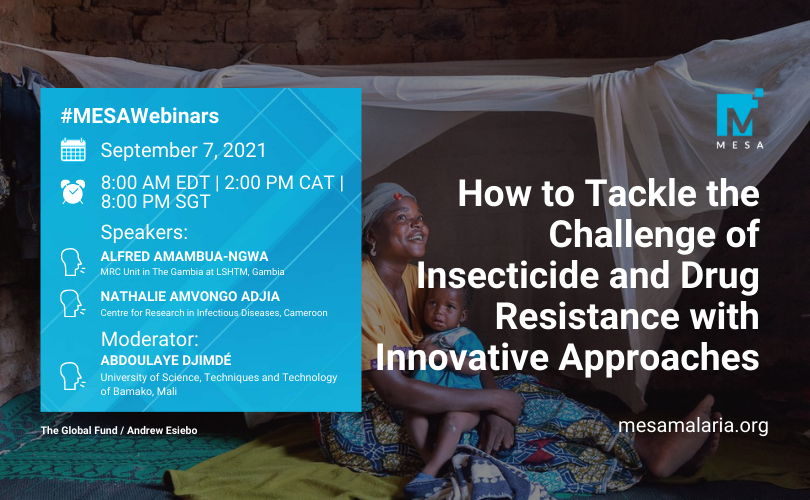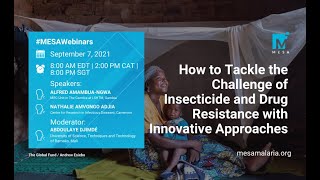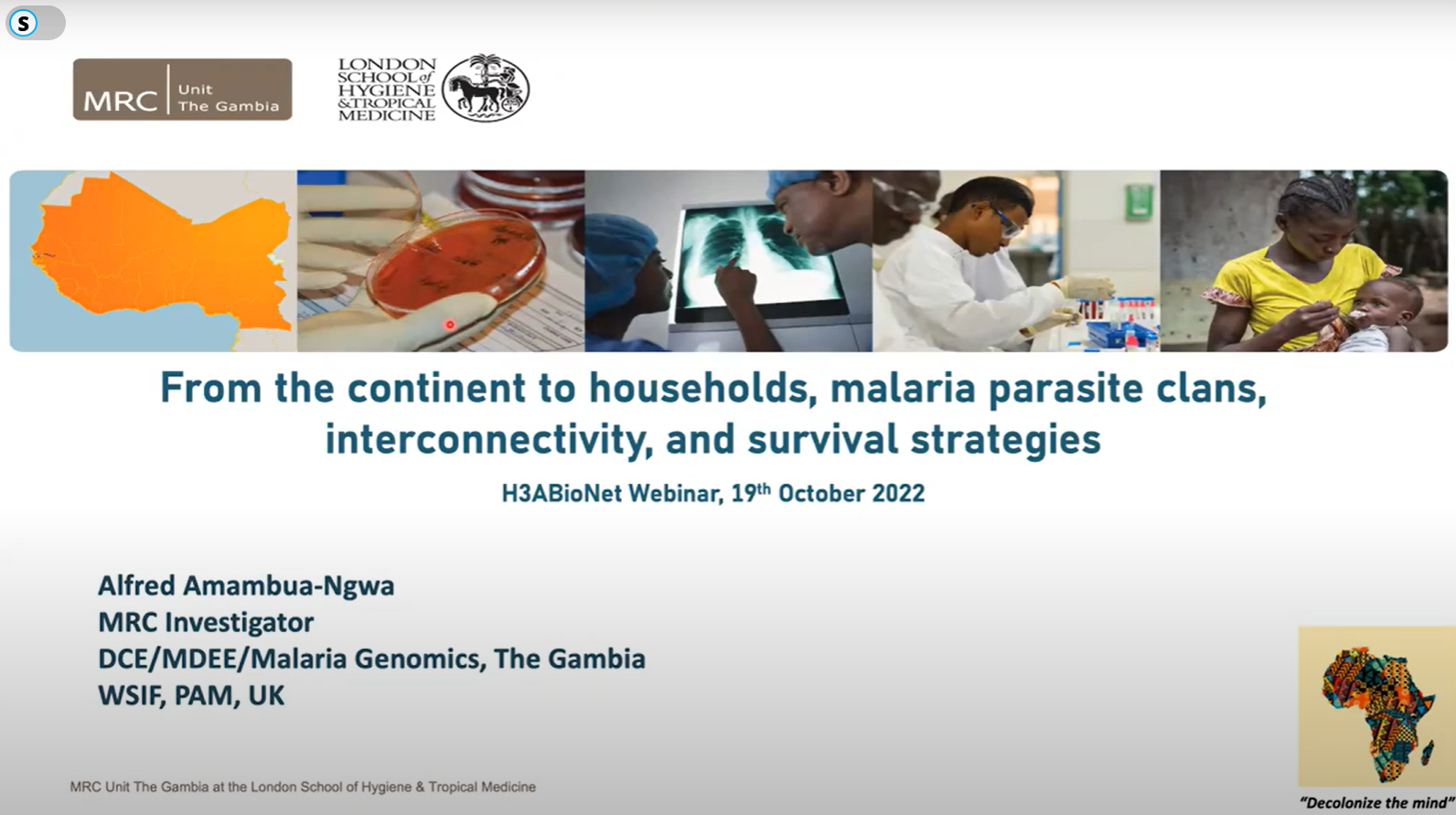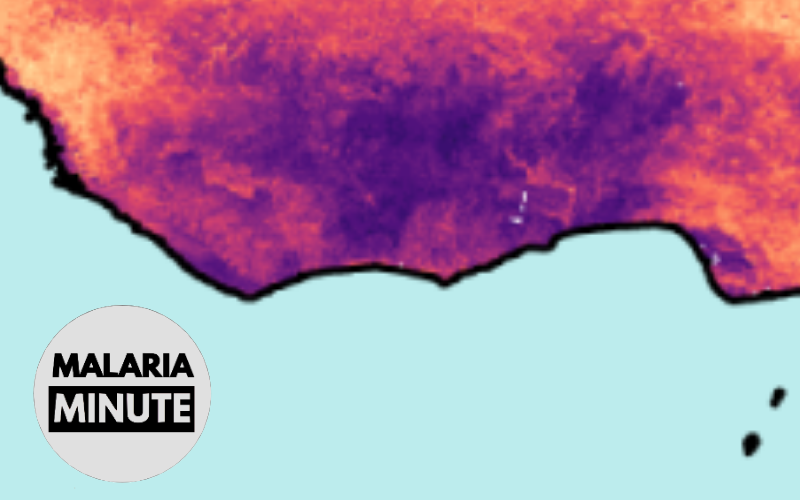MESA Webinar 4 – How to Tackle the Challenge of Insecticide and Drug Resistance with Innovative Approaches
Published: 16/09/2021
This report is brought to you by the MESA Correspondents Nkemngo Francis Nongley, Vita Mithi, Faith Hungwe, and Ana Alonso.
THEMES: THEMES: Drug Resistance | Insecticide Resistance
MESA Correspondents bring you the coverage from the MESA Webinar 4 – How to Tackle the Challenge of Insecticide and Drug Resistance with Innovative Approaches
Tuesday, September 7th, 2021
Opening Remarks
The 4th MESA Webinar: Science for Malaria Impact webinar series was chaired by Prof. Regina Rabinovich who welcomed everyone and highlighted MESA’s aim of assembling the malaria community of change-makers as well as publicizing the high-level impact research from outstanding malaria researchers in endemic countries. Furthermore, she introduced the moderator of the session, Prof. Abdoulaye Djimde (Professor of Parasitology and Mycology at University of Science, Techniques and Technology of Bamako, Mali) who profiled the speakers: Prof. Alfred Amambua-Ngwa and Dr. Nathalie Amvongo-Adjia.
Malaria parasite populations, transmission and adaptation across African endemic populations
Alfred Amambua-Ngwa (Centre for Genomics and Global Health of the MRC Unit in The Gambia at LSHTM) commenced by a brief capture of his background PhD training at the University of Buea, Cameroon before transitioning to the MRC, The Gambia to establish a research group on malaria. The talk started by highlighting the significant reduction in malaria burden over the past decades owing to a combination of interventions targeting the Anopheles vector (such as insecticide-treated nets, ITNs) and the Plasmodium parasite (such as artemisinin-combination therapy, ACTs). However, stagnating progress due to insecticide and drug resistance is a major concern. Understanding the structure and complex dynamics of natural parasite populations in response to different types of ACTs is key to monitoring the spatial pattern of drug resistance. Genotyping through molecular markers has provided insights on the impact of drugs on the parasite. Unfortunately, real-time data on the prevalence of drug resistance alleles particularly in Africa is limited due to a lack of manpower and analytical skills. Recent data indicate increasing frequencies of single nucleotide polymorphisms (SNPs) associated with tolerance to the currently used ACT partner drugs, which could be influenced by the intensity of disease transmission. The pursuit to build local capacity in Plasmodium parasite genomics stimulated the creation of the Pathogens Genomic Diversity Network Africa (PDNA) composed of a pool of researchers across several African countries sharing ideas for malaria elimination. Using 2300 parasite genomes from 27 locations spanning 15 African countries, the team showed a remarkable variation in the P. falciparum parasite genotypes circulating across Africa. They revealed the existence of different interacting P. falciparum sub-populations across six regional blocks including a distinct admixed Congo population, a highly distant Ethiopian population and a unique converging population from Malawi and Madagascar. Shared haplotype patterns were observed between populations from East to West and vice versa due to gene flow, correlating with the spread of drug resistance. Interrogating drug resistance loci across the continent revealed that the parasite population from West Africa has 3 haplotype sub-populations based on their drug resistance backbone. Strong differences in haplotypes around drug resistance genes were observed particularly for Pfcrt and Pfdhps. Additionally, haplotypes around the AP2-mu gene locus were shared between the Ghana and Malawi populations. This locus harbors mutations that enhance in vitro survival of P. falciparum. Moreover, positive selection of the PfAAT1 gene, which emerged at the same time with the Pfcrt, was detected in The Gambia, where it is almost at fixation. SNPs in both genes are strongly linked. The mutant variant of the PfAAT1 locus is widespread across the continent except in Malawi, where the wild type is dominant. Exposure of parasite isolates to increasing drug concentrations identified in vitro tolerance to Lumefantrine and experimental compounds. Genome-wide association studies (GWAS) on these parasites revealed novel polymorphisms such as the DBLMSP2 antigen against Lumefantrine, which shares haplotypes with South-East Asia (SEA) parasite populations. Overall, the studies demonstrated circulation of a heterogenous parasite population in West Africa in contrast to a homogenous East African population. Introgression of parasites across the continent may favor the emergence and spread of new resistance loci so that continuous high resolution of molecular drug resistance surveillance and validation of markers remains fundamental.
Exploring the spread of metabolic (GSTe2) and target-site (Rdl) insecticide resistance alleles in Anopheles funestus vector populations across a major mountainous landscape (the Mount Cameroon)
Nathalie Amvongo-Adjia, Research Officer at the Institute of Medical Research and Medicinal Plant Studies (IMPM) and Postdoctoral Research Assistant at the Centre for Research in Infectious Diseases (CRID) in Cameroon, presented the challenges posed by increasing insecticide resistance of the main An. funestus vector for the successful control of malaria in a mountainous area in South-West Cameroon. A better understanding of the impact of this mountainous topography in the spread of resistance alleles could improve malaria vector control and resistance management interventions. The research team at CRID characterized the vector bionomics and assessed the influence of the geographical landscape on the frequency of metabolic (GSTe2) and target-site (Rdl) alleles conferring resistance to DDT and Dieldrin respectively in An. funestus. Specifically, the study investigated the spread of GSTe2-based metabolic and Rdl-based target-site resistances by interrogating the genetic diversity of both genetic markers in An. funestus populations across the Mt Cameroon altitudinal transect. Female adult mosquito sampling was conducted between 2010 and 2014 using the human landing catch method. Molecular species identification followed by resistance marker genotyping and direct sequencing was performed. Anopheles mosquito was the most represented genus collected in each of the four locations. Female Anopheles species composition revealed the disproportionate predominance of An. coluzzii and An. funestus as the primary malaria vector. High frequencies of GSTe2R (67–81%) and RdlR (49–90%) resistance alleles were observed in An. funestus throughout the localities, whereby GSTe2R frequency increased with altitude, as opposed to a decrease in Rdl. Analysis of polymorphisms in the GSTe2 and Rdl genes in An. funestus revealed key mutations in coding regions of the full DNA sequence. Patterns of genetic diversity and population structure analyses revealed high levels of polymorphism with 24 and 16 haplotypes for GSTe2 and Rdl, respectively, clustering according to their resistance profile. In conclusion, the study demonstrated reduced diversity patterns of both resistance alleles throughout the Mt Cameroon region, with evidence of positive selection occurring on the GSTeR and RdlR backbones which may lead to fixation. Therefore, early implementation of strategies to reduce the selective pressure driving insecticide resistance is pivotal.
Closing remarks
Abdoulaye Djimde opened the question-and-answer session where the presenters responded to the various questions asked by the audience. Furthermore, Regina Rabinovich congratulated the speakers for the wonderful talks and discussion and thanked the attendees for their participation. Finally, she thanked the moderator and announced the next webinar session entitled “Below the Target: Innovative Ways to Accelerate Increase in IPTp Coverage” on October 13th.
*Read here the pending questions & answers addressed by the speakers after the Webinar.
This report is brought to you by the MESA Correspondent Nkemngo Francis (Centre for Research in Infectious Diseases – CRID, Yaoundé and University of Buea, Buea, Cameroon). Senior editorial support has been facilitated by Adelaida Sarukhan (Barcelona Institute for Global Health – ISGlobal, Spain).
Published: 16/09/2021
This report is brought to you by the MESA Correspondents Nkemngo Francis Nongley, Vita Mithi, Faith Hungwe, and Ana Alonso.
THEMES: Drug Resistance | Insecticide Resistance



